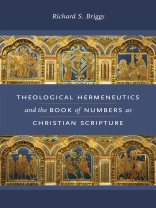How should Christian readers of scripture hold appropriate and constructive tensions between exegetical, critical, hermeneutical, and theological concerns? This book seeks to develop the current lively discussion of theological hermeneutics by taking an extended test case, the book of Numbers, and seeing what it means in practice to hold all these concerns together. In the process the book attempts to reconceive the genre of ‘commentary’ by combining focused attention to the details of the text with particular engagement with theological and hermeneutical concerns arising in and through the interpretive work. The book focuses on the main narrative elements of Numbers 11–25, although other passages are included (Numbers 5, 6, 33). With its mix of genres and its challenging theological perspectives, Numbers offers a range of difficult cases for traditional Christian hermeneutics. Briggs argues that the Christian practice of reading scripture requires engagement with broad theological concerns, and brings into his discussion Frei, Auerbach, Barth, Ricoeur, Volf, and many other biblical scholars. The book highlights several key formational theological questions to which Numbers provides illuminating answers: What is the significance and nature of trust in God? How does holiness (mediated in Numbers through the priesthood) challenge and redefine our sense of what is right, or ‘fair’? To what extent is it helpful to conceptualize life with God as a journey through a wilderness, of whatever sort? Finally, short of whatever promised land we may be, what is the context and role of blessing?
Daftar Isi
Preface
Abbreviations
Introduction: A Map of the Wilderness
1. The Figure in the Wilderness: Readings in the Book of Numbers
2. Trust and Suspicion: Approaches to a Holy Text that Invites Little Approach
3. “Fraught with Background”: Towards Ascriptive Realism and Figural Reading (Numbers 10–12)
4. “What Did You Go Out into the Wilderness to See?”: Theological Interpretation, the Eyes of the Heart, and Karl Barth’s Reading of Sloth (Numbers 13–14)
5. “It is the Text that Swallows Up the World”: The Eclipse of Numbers’ Narrative and the Literal Sense of Korah’s Rebellion (Numbers 15–16)
6. “The Rock was Christ”: Typology Between a Rock and a Hard Place (Numbers 20)
7. “‘Peace, Peace, ’ when there is no Peace”: The Zeal of Readers in Defense and in Dissent (Numbers 25)
8. Blessing for an Unfinished Journey: On Reading Numbers as Christian Scripture (Numbers 6; 22–24; 33)
Bibliography
Indices
Tentang Penulis
Richard S. Briggs is lecturer in Old Testament and director of biblical studies at Cranmer Hall, St. John’s College, Durham University. He is the author of a number of books, including The Virtuous Reader: Old Testament Narrative and Interpretive Virtue.







![Sampul Brian Schrag & Julisa Rowe: Community Arts for God's Purposes [Chinese] 貼近神心意的社群藝術 Sampul Brian Schrag & Julisa Rowe: Community Arts for God's Purposes [Chinese] 貼近神心意的社群藝術](https://static.worldofdigitals.com/thumb_webp/740/9781645083740.webp)




